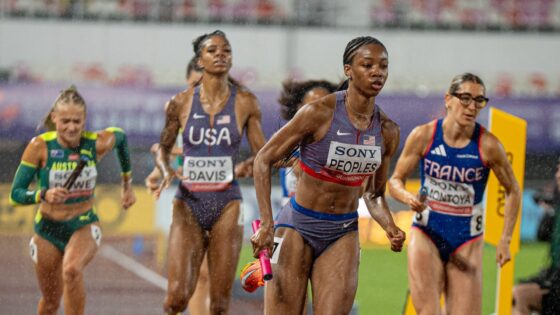For a nation that’s long worn the crown in sprinting relays, Team USA’s showing at the 2025 World Athletics Relays was nothing short of jarring. One gold medal, just one, was all the red, white, and blue could muster in Guangzhou. The weekend was riddled with fumbled batons, botched exchanges, and lineup decisions that left fans scratching their heads. The men’s 4x400m squad didn’t even make the final, and the mixed 4x100m team unraveled mid-race with a mistimed handoff between Jada Mowatt and Kendal Williams. The roster felt like a second-string setup, and the results showed it.
But as critics pounced on the poor performance, they didn’t shy away from pointing out a deeper issue: the money. There just isn’t enough financial incentive for top-tier athletes to prioritize the World Relays. The tipping point? A viral post by TrackSpice shared the prize breakdown, where fans quickly noticed the mixed 4x100m gold paid just $28,000. Far below the standard $40K for the others.
In a sport where opportunities to earn are already rare, American Track and Field star comments added fuel to a growing conversation about whether the World Relays are worth the risk for elite stars. Track World News took to YouTube, breaking down exactly how and why Team USA stumbled so hard in Guangzhou, and their analysis quickly spotlighted the elephant in the room. Lack of incentive.
As fans questioned why the U.S. roster lacked its usual star power, American sprinter Noah Williams didn’t mince words. “Basically, the answer to that would be the incentive is too low,” he said, speaking candidly about why top-tier names sat this one out. “Top-flight people in America are getting $100,000 to go down to Grand Slam… there’s more incentive for them… more they’re getting out of that, as they would be taking a bit of, I guess, country pride in going down and competing at the World Relays.”
Williams’ comments struck a nerve because they cut to the heart of a growing conversation in track and field. Financial sustainability. While emerging leagues like Grand Slam Track and Athlos are starting to offer better pay structures and more regular competition windows, the reality is still harsh. Track athletes are often underpaid and overworked. They juggle brutal training schedules, international travel, and constant physical strain, all within a sport that peaks for only a few months each year.
World Relays, once a marquee event, now struggles to pull in names like Sha’Carri Richardson and Noah Lyles, and it’s not due to a lack of patriotism. As Williams put it bluntly, “The way they split the checks up and everything is very interesting… It’s kind of like almost treating it like a participation award.” What’s more, Williams emphasized that it’s not a question of ability. It’s about how the system is built. “They want as many people as possible running,” he said.
“And I don’t think that’s the course of action when you want to dominate. I think the USA—we have the bodies, we have the talent… to dominate every single time, whether it’s Texas Relays, Florida Relays, or World Relays.” His frustration echoed that of many athletes who feel that without better incentives and smarter organizational planning, top-tier talent will keep drifting toward more lucrative and professionally rewarding alternatives. Until that changes, even a track giant like Team USA can and will look vulnerable.
Baton blunders and a growing crisis within Team USA
The backlash came quickly and loudly. Mechelle L. Freeman, former Olympic gold medal-winning coach, didn’t sugarcoat her frustration on X. “It can never be about everybody getting a chance to run. The decisions should always be based on doing what it takes to accomplish the task as best as possible, every single time. Period. #MinimizeRisk #MaximizePerformance.”
Her statement was a sharp jab at what many perceive as flawed selection policies and a lack of performance-driven decision-making. Moreover, it hints at deeper issues behind the scenes. From former athletes to current analysts, the chorus is growing louder, questioning not only the chemistry and preparation but also the leadership guiding Team USA’s relay future.
The post Major Flaw Behind America’s Subpar Performance Exposed as Track and Field Star Gives Bitter Reality Check appeared first on EssentiallySports.
